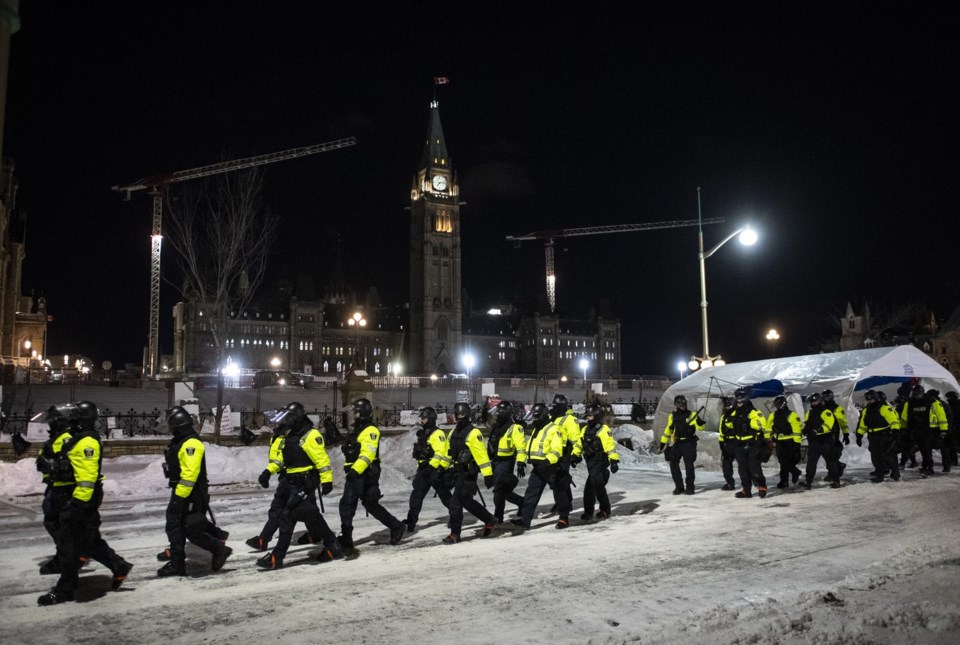OTTAWA — A judge erroneously concluded it was unreasonable for the federal cabinet to use the Emergencies Act in 2022 to quell protests in the national capital and at key border points, says a lawyer for the government.
In his January 2024 ruling, Federal Court Justice Richard Mosley said he revisited the events with the benefit of a more extensive record of the facts and the law than the government had when it proclaimed a public order emergency.
Lawyer Michael Feder, representing the government, told the Federal Court of Appeal on Tuesday it was unfair of the judge to fault federal decision-making using "20/20 hindsight."
Feder said that hindsight came during "the peaceful de-escalation that occurred in light of the emergency measures now being impugned."
"Who, outside of a courtroom, would seriously suggest the situation was going to get better in the absence of emergency measures?"
For nearly three weeks in January and February 2022, downtown Ottawa was filled with protesters, many in large trucks that rolled into the city and blocked streets around Parliament Hill.
The usually calm streets around the Hill were beset by blaring horns from big rigs, diesel fumes, makeshift encampments and even a hot tub and bouncy castle as participants settled in.
The influx of people, including some with roots in the far-right movement, prompted many businesses to close temporarily, and aggravated residents with noise, pollution and harassing behaviour.
Public anger mounted over a lack of enforcement action by Ottawa police.
Trucks also clogged key border crossings, including key routes to the United States at Windsor, Ont., and Coutts, Alta.
While many demonstrated against COVID-19 health restrictions, the gathering attracted people with a variety of grievances against Prime Minister Justin Trudeau and the Liberal government.
On Feb. 14, 2022, the government invoked the Emergencies Act, which allowed for temporary measures including regulation and prohibition of public assemblies, the designation of secure places, direction to banks to freeze assets and a ban on support for participants.
It was the first time the law had been used since it replaced the War Measures Act in 1988.
In a Feb. 15 letter to premiers, Trudeau said the federal government believed it had reached a point "where there is a national emergency arising from threats to Canada's security.''
The Canadian Civil Liberties Association and several other groups and individuals argued in Federal Court that Ottawa ushered in the emergency measures without sound statutory grounds.
The government contended the steps taken to deal with the pan-Canadian turmoil were targeted, proportional, time-limited and compliant with the Charter of Rights and Freedoms.
Mosley concluded the federal decision to issue the proclamation did not bear the hallmarks of reasonableness — justification, transparency and intelligibility — and was not justified in relation to the relevant factual and legal constraints.
Ultimately, there "was no national emergency justifying the invocation of the Emergencies Act," Mosley said in his ruling.
Feder said Tuesday the government concluded it had reasonable grounds to believe the statutory preconditions for invoking the emergency measures were met.
The government's conclusion "doesn't have to be perfect, it just has to be reasonable," he said.
"It certainly does not have to be perfect viewed through the lens of 20/20 hindsight."
In a written submission to the Court of Appeal, the civil liberties association says Mosley recognized that the legal thresholds in the Emergencies Act had to be satisfied before the government could unlock its extraordinary powers.
Contrary to the federal arguments in the appeal, "these thresholds do not bend, much less break, in exigent circumstances," the submission says.
"The powers exercised in this case arise from the Emergencies Act, not emergencies themselves — and the thresholds in the Act must be respected. Here, they were not."
In his 2024 ruling, Mosley said the Emergencies Act is a "tool of last resort," due to its nature and the broad powers it grants to the federal executive.
The government cannot invoke the Emergencies Act because it is convenient, or because it may work better than other tools at its disposal or available to the provinces, he wrote.
Mosley also found the regulations barring participation in public assemblies violated the Charter guarantee of free expression. He said the scope of the regulations was overbroad, capturing people "who simply wanted to join in the protest by standing on Parliament Hill carrying a placard."
In addition, he cited a federal failure to require that "some objective standard be satisfied" before bank accounts were frozen, concluding this breached the Charter prohibition against unreasonable search or seizure.
This report by The Canadian Press was first published Feb. 4, 2025.
Jim Bronskill, The Canadian Press

